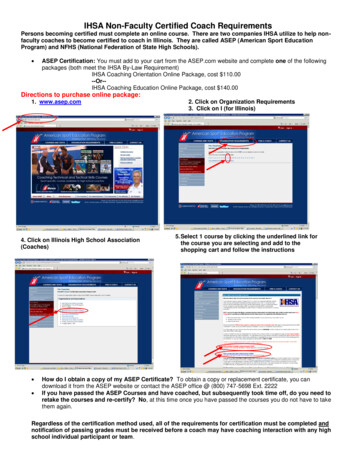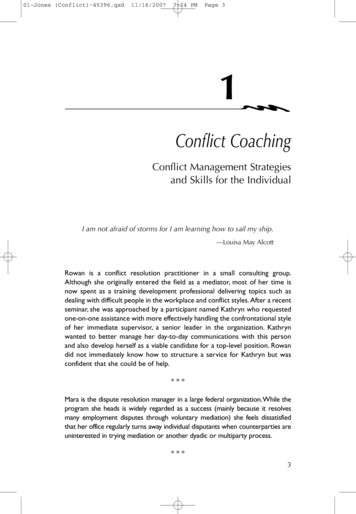
Transcription
COACHING MANUALAll of the books listed for further reading can be obtained through www.christianbook.com orwww.mastersmen.com
Master’s Men Coaching ManualBy Ken Sheppardwith Jim CotéChapter 1Introducing the SubjectDallas Cowboy, Hall of Fame football coach Tom Landry once wrote, “Throughout my career in football,as a player and as a coach, I considered one of my greatest leadership roles not to be on the football fieldbut in the home. In our present culture, too many families are splintering because of the lack of maleleadership in the home. There will be serious consequences for our nation if present trends continue.”Quoting Dr. James Dobson, he continued, “Our very survival as a people will depend on the presence orabsence of masculine leadership in millions of homes.”I couldn’t agree more. This is why we founded the Master’s Men ministry a dozen years ago – tospecifically reach men with the gospel and help men grow in Christ that they might be better fathers,husbands, citizens.”One way we do that is through the model of coaching. That is, one man giving specific life skills guidanceto another man who is teachable and who shares the coach’s values.Not only must the “protégé” share the coach’s values, the coach must share the “player’s” skill focus andperformance direction. That is, the coach must agree to assist a man to address specific skills and to go aspecific direction with them in order to accomplish a specific goal or set of goals.In other words, they must be mutually committed to success. First comes the success of the man — the“player” — in his life, the “game.” The success of the coach can be assessed and defined not bydispensing certain predetermined regimens but by tailoring instruction to enable the protégé to achievehis goals. Coaching success is determined by player success, not the other way around.And that leads to this coaching manual.This manual offers potential coaches a few basic issues and answers that we find younger men mostcommonly ask. This simple counseling approach gives coaches a brief truth that needs to be addressed,with a worldview comment to show how truth relates to our view of life, and thought-provoking points,along with scripture, so that both coach and player may study and discuss together how to integrate thetruth of God into a personal lifestyle that will lead to life success.We have tried to take some of the research task (or homework) out of the way so a coach may spend lesstime in the library and more time on the field, giving instruction to his player.All of the books listed for further reading can be obtained through www.christianbook.com orwww.mastersmen.com
This type of format was an immeasurable help to me when I first got started in the work of coaching, or asthe Bible puts it, “making disciples.” I believe you will find it helpful too.Let me leave you with a few definitions of the subject at hand and then release you to the work of helpingmen grow in skill, wisdom, spiritual stature, and in favor with God and man to become a successful manof God.The Task: to “coach” – to help younger men achieve greater performance levels in designatedareas of need.Definition: a relational, values-based process where a more experienced (older) man serves aless experienced (younger) man, guiding him toward improvement in specified life skills that arecentered on a relationship with God through Christ.The Process: the ministry of an older man taking a younger man through the general disciplineof Christian discipleship with the specific emphasis of developing a targeted action plan focusedon the development of values, skills and actions that result in better performance levels wherethe young man seeks help; according to agreed upon goals, objectives and time frames.* (Forelaboration on this process see Table 4-1, page 62, Christian Coaching, Gary R. Collins)All of the books listed for further reading can be obtained through www.christianbook.com orwww.mastersmen.com
Chapter 2Coach QualificationsAre you qualified? (1 Timothy 3; Titus 2:2)Coaches must be qualified. That is, they must be a man of God with God-affirmed success intheir lives before they can legitimately coach other men to a higher standard of living. We arenot saying a man must be perfect for none are, but we are saying that a man can not take aman further than his own experience.Therefore, some or the values we see inherent in a valid Christian coach are as follows.A coach must be biblically adept, Christ-centered, willing, available, organized, and relational.Furthermore, a coach must be goal- and improvement-oriented, one who is living an authenticChristian lifestyle of integrity in the areas to be covered. Finally, a good teacher is always agood listener, observer and evaluator.Here are a few bullets to use in the coaching experience.Essential components to coaching: Goal establishmentTalent assessmentAble to correct without negativityAble to encourage, affirm, give hopeAble to “prove” the best way; experienceAble to teach and stay on courseAble to evaluate and adjust plan when necessaryAble to demonstrate by personal walk; authenticityAble to stimulate action; motivateAble to encourage visionKnow when, how to rewardKnow when your role is doneAll of the books listed for further reading can be obtained through www.christianbook.com orwww.mastersmen.com
Chapter 3Finding your Protégé or “Player”When considering this type of ministry, we have a few suggestions on how to get started andspecifically what to look for in the man you intend to coach.Typically, this type of ministry opportunity presents itself. That is, an admiring young man willask you if he could meet to discuss “a few things.” I say do it. Go and find out what he wantsand evaluate as you listen whether you can help, whether you two are a “fit”.If you have known the individual for a length of time, this evaluation process should be fairlyeasy. If not, you will need to focus on the man and the opportunity more intentionally.By the way, when I said above “an admiring young man,” I mean simply that he has seensomething in you that he believes will help him. Be flattered. And yet understand that he may benaïve, self-serving or the real deal. You won’t know till you meet with him and listen to his heart,as well as his words.When you meet, make sure you give him plenty of eye contact (turn off your phone) and see ifhe reciprocates. Ask lots of questions so you can ascertain both your real ability to help and hisreal desire to be helped. Here are a few of the bullet points you should look for: A heart for Jesus, His body, family, and othersDesire and ds well to constructive criticismSets and pursues goalsAssesses and adjustsCompletes assignmentsSeeks and shows respectHumbleHas potentialWants help and will work at itIf you feel good about the meeting and the man, schedule more time. I would also advise you toTEST him (1 Timothy 3:10a) to see if he is really committed. As a test you may give him somereading assignment, a project to complete before you meet, or something that will test hiswillingness to discipline himself and shows he values you and your time.All of the books listed for further reading can be obtained through www.christianbook.com orwww.mastersmen.com
Chapter 4The Opportunity and Tactics of CoachingFor starters you may have no need to use tactics. Your coaching assignment may last only onelunch. At that lunch your player may ask you a relatively easy question, you answer, he thanksyou, and that is the end. Chalk up one for incremental success. Incremental because it wasn’tcomprehensive, but success nonetheless as the player leaves with direction, answers, andpotential for skill improvement.On the other hand, if you find at your first meeting that the issues to be addressed are morecomprehensive and complex than one meeting will address, you must set up more time. AND, ifyou feel it warrants, you should consider setting up a specific format for the two of you to followwhich is also laced with assessment tools so that you may have the benefit of some diagnosticinfo to help you better serve your protégé. These assessment tools, whether you use one ormore, are simply meant to give you a better feel, up front, of the real needs and strengths ofyour player. In that way you can better use your time and better integrate your skills andexperience to more efficiently and effectively help your player succeed.You may want to use some of the following tools:“Player” assessment1. The following list uses pre-manufactured resources that can be found in bookstores oronline or even from the Human Resources department of your business or church. Spiritual gifts assessment Professional gifts assessment S.W.O.T analysis2. This list can simply be processed by a series of questions listed on a yellow pad or“Word doc” that you prepare beforehand. Have the protégé list their: Satisfactions Dissatisfactions Desired improvements“Player” goals3. Determining client goals will provide the specific target you are both shooting at. It isimperative for true progress. What are they, clarify Make them S.M.A.R.T. — 5 aspects1. Specific2. Measurable3. Achievable4. Relevant5. Time-frameThis process will include both a discussion and a brainstorming session where you writedown the goals before narrowing them down. It will conclude with an attempt to quantifythe process in a measurable way known as SMART goals. This S.M.A.R.T. format canbe retrieved from your HR department if you want something formal but it is easyenough to have your protégé simply answer the 5 aspects.All of the books listed for further reading can be obtained through www.christianbook.com orwww.mastersmen.com
“Player” mission statementA protégé mission statement is imperative for the serious player. It gives writtenpronouncement to an idea, a goal of the heart and mind. It also helps one focus in on thenon-negotiable musts of one’s life motivation. Printed and displayed prominently by theplayer it will become a constant reminder/motivation for why he is in the game and whatwinning will mean for him. craft a mission statement (for a simple process we recommend page 137 of Christian Coaching by Gary R.Collins)create the coaching process to match the mission statement“Player” plan: set the strategic planCoach, if you will do your homework here, your “field” work with the player will be easier aswell as more effective.By a plan we mean a sketch, as detailed as you believe necessary, of what time, places,skill sets, biblical information, reading and other interviews (with other skilled men in aparticular discipline) your player will need.Write out a step-by-step approach and create a calendar to match. Go over this plan withyour player, adjust as necessary and go to work. Don’t make it any harder than either of youwill submit to. Just make it workable so that your time is effective.Here is a basic list of things to ask and answer as you sketch your plan. Write out: What to work onWhat success factors to pursue, what will they look likeWhat resources to employThe timingThe coach/client schedule of meetingsHomework and assignmentsThe covenant: coach/client agreementEvaluation timing: when to adjust the planAll of the books listed for further reading can be obtained through www.christianbook.com orwww.mastersmen.com
Chapter 5ObstaclesYes, there will be obstacles. Every good thing has a negative that first must be surmounted ifgoals are to be achieved. You can expect obstacles in this type of ministry. Now we would like toaddress a few common challenges you may face.1. Coaches falling shortWhen coaches fail, what it looks like: It can take a lot of forms. One is when thecoach bails. He may do this because of time constraints, a personal problem thatconsumes his discretionary time, he may lose motivation because his player is failing, orhe may be over his head.The remedy for this is for the coach to take a break. He should do some self-coaching,self-inventory, evaluation, redirection, and look to get back in the game as soon as he isable.2. Clients falling shortWhen clients fail, what it looks like: This too can take many forms, but mostly failuremeans one of two things. The player quits on himself and the process of skill improvement. Or he fails toexecute and goes backward in his Christian development and does not want tomove forward. Anything else could be defined as a performance lapse with the hope he willregain his game, motivation and his form to move on toward success.You have two remedies when clients fail. The first is prayer; that God will move on hisheart to bring him to repentance and restore his desire for “first things” (as in situation 1),or re-motivate him to want to excel again. The second remedy is to confront him withtough love, to persuade him to get back in the game, even if it means changing coaches.3. ClosureAt some point the coaching experience either ends or changes. This is natural andshould, in our opinion, be reinforced. Why? Because we are trying to make disciples,mature men of God, not dependents.Therefore, we recommend regular evaluation times for you both to review the plan, theprogress, and the results. You may well find that you have answered his first set ofneeds and he is ready to move on without coach assistance or you may find that hisaccomplishments in the first set of skill development has elevated him into a new area ofdevelopmental need.All of the books listed for further reading can be obtained through www.christianbook.com orwww.mastersmen.com
At that point you should evaluate whether you are the man who can take him there orwhether you should recommend him to another so he might continue his upward courseof progress.Coach: from time to time, until it is time, we recommend you ask yourself the followingtwo questions: When to stop the processHow to do it with graceAll of the books listed for further reading can be obtained through www.christianbook.com orwww.mastersmen.com
Chapter 6CompletionIf one of the men involved in this coaching experience doesn’t move or die, our experience hasshown us that three things will typically happen to a coaching-player relationship. First, therelationship will suffer a slow death caused by not being able to meet consistently coupled withpoor preparation on the part of either person.Second, the relationship will end because one of you is dissatisfied with the way it is going. Orthird, it will end because it HAS achieved its desired purpose.Believe it or not, our experience shows that success outweighs failure for those relationshipsthat follow the sequence of steps as outlined in this manual. When a legitimate, motivated,available coach meets a legitimate, available, teachable player, and they work this plan, theycan expect to make progress and be successful.With this encouragement as a backdrop, consider the following markers to help you determinewhat success will mean for you and when the player will be ready to break loose from his coach.1. Markers of successa.b.c.d.Client achievement: he hits his goalsClient attitude: happy about his experienceClient aptitude: his skills are improved, true growth realizedClient appreciation: he is satisfied with the process2. Re-evaluate whether to stop or continuea. Relationship works1. Client desires new areas or levels of success2. Coach has the ability, availability and desire to get him there3. Client has the ability, availability and desire to get there4. Create a new coaching/client commitment5. Repeat the tacticsORb. The opposite of the above is true1. You have prayed and met to discuss frankly the failure2. Stopping the meeting time is the best use of timeAll of the books listed for further reading can be obtained through www.christianbook.com orwww.mastersmen.com
PART 2COACHING GUIDESECTION 1 - Man’s Relationship with GodThe TruthThe Christian worldview is based upon two basic premises: God is perfect and man is not. Theperfect God created man for fellowship with himself. This was spoiled by man’s failure in theGarden. Since then, the story is one of God’s provision for man’s salvation and man’s responseto the provision. God became a man in the person of Jesus, and as a perfect man paid thepenalty for all men’s sins by his death on the cross. By his resurrection God is able torighteously justify all who believe in him. The issue therefore becomes, “What do you think ofJesus?” Man is born separated from God and unable to save himself. He is tempted by Satanand allured by the world to pursue a life of enlightened self-interest. The problem is, he is usingartificial light. Eventually the “crutches” he has used throughout life give way; the weak threadshe has woven into the fabric of his life begin to tear and he is pushed by his circumstances tothe recognition that he cannot truly control his life. God uses the disarray and despair of hiscircumstances to humble him and make him willing to listen to the truth.WorldviewSimply put, in life a man is left with accepting God’s provision for his salvation or doing his bestto earn it by some means. Most have some organized plan for good works or a vague hope thatif he just tries hard enough God will consider him good enough and he’ll be rewarded witheternal life. He hopes God will “grade on the curve.” All of man’s approaches to establishing arelationship with God require what he must “do.” The gospel, or good news, is that God hasalready “done” the required work for us in Christ.Points to PonderWhat do all men share in common? Rom.3:23; Isa. 53:6; 64:6What role does man’s good works play in his salvation? Eph. 2:8,9; Titus 3:5,6;How can a man obtain a righteousness that is acceptable to God? Rom. 4:5; 2Cor. 5:21Can a man know that he has eternal life? John 3:16-18; 5:24; 1 John 5:11-13For Further ReadingA Survey of Bible Doctrine, Charles C. Ryrie, Chapter 7, “Christ’s Salvation,” Moody PressMore Than a Carpenter, Josh McDowell, Tyndale HouseThe Case for Christ, Lee Strobel, ZondervanMere Christianity, C S Lewis, HarperOneEternal Security, Charles Stanley, Thomas NelsonAll of the books listed for further reading can be obtained through www.christianbook.com orwww.mastersmen.com
SECTION 2 - A Man’s Relationship with HimselfThe TruthHow we perceive ourselves is often referred to as self-image. Many view themselves as inferior,others as superior. In all cases, unless one’s perspective is based upon a biblical perspective ofman’s worth you are left with an inaccurate viewpoint. Poor self-image began in the Garden asevidenced by the guilt, fear and blame game demonstrated immediately after the Fall. Fear is atthe heart of practically all self-image problems. Until we come to see ourselves as God sees us,we cannot have a true and healthy view of ourselves. True self-worth comes from knowing andfeeling that God has created us in his image. Recognizing that all of our talents and assets aregifts from God, given for us to use as He intended, should keep us from the problem of pride.Recognizing that He is the sovereign God who ultimately controls everything should keep usfrom feelings of inferiority or worthlessness when we fail. The world keeps score one way; theman of God uses a different scale of values. To know that one has done his best and has doneso while walking in obedience to God promotes a healthy sense of well-being that is constantwhile experiencing success or failure.WorldviewMen are hard wired for success. The competitive pursuit of power, influence and affluencedominates their lives. They are convinced that if they can achieve a certain level of success inthese areas they will be contented and happy. Success equals good self-esteem; failure bringsfeelings of inadequacy. The shallowness of using what we wear, where we live and what wedrive to feel good about ourselves becomes painfully apparent. Stress builds in all areas of life,especially work and home. It is out of this pain that most men become willing to listen to theLord.Points to PonderWhat are the primary causes of low self-esteem? Gen 2:17What role does fear play in our view of ourselves? Gen. 3:1-12How does our view of God affect our self-esteem? Psa 139:14; Heb 2:5-11; Phi 2:4-8What is God’s view of believers and unbelievers? John 3:16-18; Eph 1:3-8For Further ReadingSelf-Image: How to Overcome Inferiority Judgments, Lou Priolo, P & R PressThe Biblical View of Self-Esteem, Self-Love and Self-Image, Jay Adams, Harvest HouseAll of the books listed for further reading can be obtained through www.christianbook.com orwww.mastersmen.com
SECTION 3 - Man and His PrioritiesThe TruthLegendary football coach Tom Landry was often quoted as saying he lived his life with threepriorities in mind: faith, family and football, in that order. This remains a great pattern for all, as itis biblically based and keeps first things first. If a man is able to keep his priorities in properorder he will experience confidence in all he does. He is truly attempting to honor the Lord withall of his life.Faith means a man’s personal relationship with God. This includes many external aspects(Bible study, prayer, self-analysis, meditation, planning and fellowship, church and witnessing,et. al.), but it is all based upon a man’s individual heart attitude toward his God and Savior. It isthe moment–by-moment walk through his day with God and his will in a man’s conscious andsubconscious thoughts. Without a strong walk with God pursuits of the other priorities are weakand prone to failure.Family refers to the leadership role he is called by God to play in the lives of his wife andchildren. A man’s first service to God is to be a good husband and father.Career, or work, is the final major priority a man must constantly keep in mind. It is the meansby which he is able to provide for his family as well as creatively express his own God-givencapacity to exercise dominion over a part of his world.WorldviewSuccess is viewed very differently by the world. It values money and power. Businesses areusually bottom line driven and do not take a godly man’s personal priorities into account. Inpractically every arena of life, a man is constantly challenged to guard his time and energies inthe best way possible to insure that he is keeping first things first. It is an extremely difficultbalancing act, and it is never achieved perfectly nor is it ever finished.Points to PonderIs it possible to fully master one’s time and priorities?What major issues need to be addressed in your life as you consider priorities?What does it mean to major in the minors? How about to sacrifice the best on the altar of thegood?How can a man ever be satisfied with his progress in this area? How good is good enough?Scriptures For StudyMatt. 6:33; Prov. 3:5-6; Matt. 6:19-24; Phil. 3:7-14; Col. 3:1-4; 1 Tim. 5:8; 6:6-12For Further ReadingTake It to the Limit, Andy Stanley, Multnomah PublishersGetting a Grip, Bill Hybels, ZondervanJuggling Chainsaws on a Tightrope: Real Life Stuff for Men on Stress, Tim McLaughlin,NavPressQuiet Strength, Tony Dungy, Tyndale House PublishersAll of the books listed for further reading can be obtained through www.christianbook.com orwww.mastersmen.com
SECTION 4 - A Man’s Relationship with His WifeThe TruthNext to God, a man’s relationship with his wife is the most important one in life. In fact, Godchose marriage as one that uniquely pictures our relationship with Him. This establishes theextremely high standard God has set for men in marriage. God created man and woman withspecific and meaningful gender differences. Man’s God-given assignment as provider andprotector is complemented by woman’s role of nurturing, caring, and providing the necessarystructure for the family home. The differences are designed to complement each other, notcompete. They are co-equal in marriage and neither is superior in nature. While Goddesignates man to a position of headship and leadership, this does not assign the woman to aninferior position. Love is to be the driving motivation for both, that is, seeking the other’s bestinterests as they work together to have dominion over the world around them. Since itsentrance into human experience, sin has affected the marriage relationship. Neither man norwoman is inclined to fulfill their responsibilities to each other. Both tend to be headstrong andselfish, experiencing varying degrees of unhappiness because their legitimate needs aren’tbeing met, let alone their desire for real fulfillment in the relationship. The key to solving this isto recognize the leadership role that God has assigned to man and gifted him to fulfill. Thecommand to love your wife as Christ loved the church is the summary concept. While this canbe difficult to do (and impossible in our own strength), God provides his Holy Spirit to strengthenus for the task. His Word gives us the principles that point us to reality and success.WorldviewSince the Fall, men and women have rebelled against God’s intended purposes in making themdifferent. Man has fought against the proper servant leadership role to which God called him.Woman has been drawn to avoid her assigned role and to usurp the role and responsibility ofthe man. Both are guilty of role-reversal. The world today considers the biblical viewpoint asarchaic, unfair and the basis for most of the injustice that we see in the world today. Anegalitarian view of marriage is promoted (if marriage is even considered at all!) and the biblicalcomplementarian view is regarded as primitive and designed by self-serving men. Thisantagonism is prevalent inside the church as well as outside. The remedy is for a man to stepup to his responsibility as head of the marriage and to begin to lead in a godly way. That is, tobegin to love his wife in a caring, affectionate, serving way. As a man does this, the love andrespect that the woman observes and feels in his actions and attitudes will cause her to respondin love.Points to PonderWhy did God create man? Woman? Gen. 1:26-28; 2:18-25What is the standard for a man’s love of his wife? Eph. 5:21-33How is a man’s relationship with his wife a reflection of his relationship with God?Is it possible to have a bad relationship with his wife and a good one with God?What does it look like to love your wife as Christ loved the Church? 1 Pet. 3:1-7For Further ReadingThe Five Love Languages, Gary Chapman, Moody PressLove and Respect, Dr. Emerson Eggerichs, Thomas Nelson PublishersAll of the books listed for further reading can be obtained through www.christianbook.com orwww.mastersmen.com
SECTION 5 - A Man and His ChildrenThe TruthChildren are declared to be an inheritance from God. He gives them to us to love. This includesnurturing, affirming and directing them. And this can be very problematic. They all possess asinful nature and want to go their own way. Tough decisions about how to rear them have to besorted out by the parents. Every thoughtful man must address issues from diapering to “the talk”in one way or another. In all ways, love for the child must prevail if we are to succeed in fulfillingour responsibility to God. Remembering that love is an active verb, only known by the action itproduces, there are several gifts a man must give his children. The greatest gift he can givethem is a good relationship with his wife. They will always remember and most often repeatthe way they saw you treat their mother. They will note what is important to you and emulatethat.Next, a man must give them his time. Most men view home as a place to go and rest. It isactually a place to go and lead. Most men spend an astonishingly small amount of time withtheir children each day. We want to spend time with those we love.Next, the gift of affirmation is critical for a child’s proper maturation. They need to know thatthey are okay right now. You love them just as they are. Not just after a touchdown or a goodreport card. When a child messes up is when he needs affirmation the most. Studies haveshown that most men never felt the affirmation of their father as a child. The resultant insecuritycan manifest itself in unhappy, even tragic consequences for the child as he tries to findaffirmation from others.Finally, discipline is a true gift of love. A lack of it is evidence of a lack of love. Knowing howmuch, how often, what type and how long to discipline each child is a constant struggle. A keyprinciple: the best discipline is the type that leads to self-discipline. Helping the child learn howto control himself is the goal.WorldviewWhile the western world in general subscribes to good care of children, the world systemcompetes for a man’s time and energy. His career, community involvement, recreation, and just“kicking back” can relegate his parental responsibilities to obscurity. In addition, the worldgenerally rejects the concept of sin and increasingly justifies irresponsibility. If a man is to live upto his role as a father he has to make hard and often unpopular choices as to how he spendshis time, influence and money. The high number of fatherless homes only compounds theproblem. Corporeal punishment is viewed as primitive and abusive.Points to PonderWhat is the relationship between a husband’s treatment of his wife and his children’s future?Who does God designate as the spiritual trainer of the family? Deut. 6:6-7What are some rationalizations men use to dodge their parenting responsibilities?Martin Luther said that a man should discipline with a rod in one hand and an apple in the other.What did he mean?How can a father teach his children about God’s grace and still hold them accountable for theirwillful disobedience?All of the books listed for further reading can be obtained through www.christianbook.com orwww.mastersmen.com
How much of a father’s interaction with his children concerns disciplinary intervention vs.positive, affirming time
Master's Men Coaching Manual By Ken Sheppard with Jim Coté Chapter 1 Introducing the Subject Dallas Cowboy, Hall of Fame football coach Tom Landry once wrote, "Throughout my career in football, as a player and as a coach, I considered one of my greatest leadership roles not to be on the football field but in the home.











